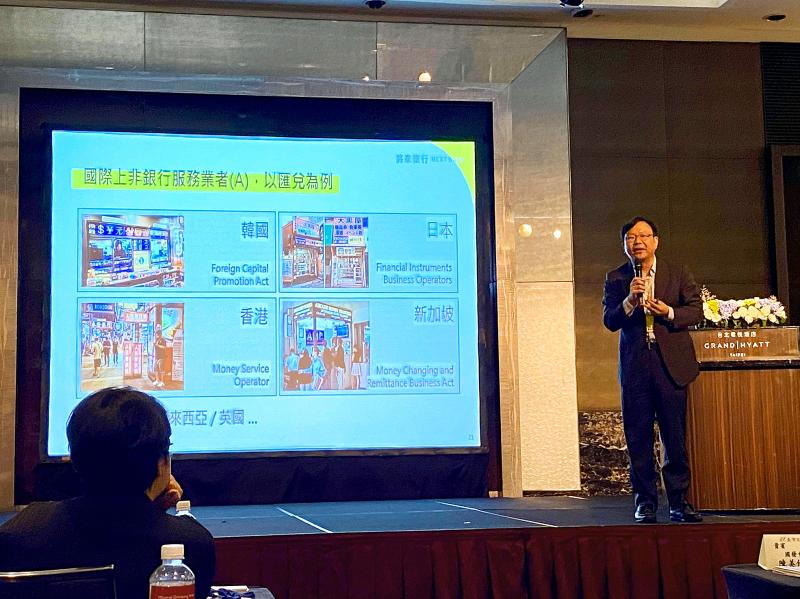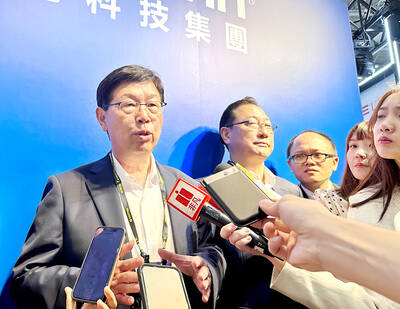Web-only Next Bank (將來銀行) aims to catch up major online banking services, such as Taishin International Bank’s (台新銀行) Richart service or the digital service offered by O-Bank Co (王道商業銀行), general manager Liu I-cheng (劉奕成) said yesterday.
“I admire the two banks and think they are doing a fine job, so my goal is to at least keep pace with them after launching our business,” Liu said at a forum organized by the Taiwan Fintech Association in Taipei.
Next Bank is the first among the nation’s three virtual banks to clearly announce its plans regarding competition with the nation’s existing banks.

Photo: Kao Shih-ching, Taipei Times
Liu did not elaborate how many clients Next Bank aims to attract in the first year.
Taishin’s Richart online service had 2.11 million digital savings accounts as of the end of June, the highest among all banking Internet services, while O-Bank ranked fourth with 441,945 accounts, Financial Supervisory Commission data showed.
Next Bank would rely heavily on big data analysis to set up a competitive business strategy and understand its clients’ needs, because as a virtual bank it is not allowed to set up physical branches and it would not be able to interact with customers face-to-face, Liu said.
Given foreign virtual banks’ vibrant approach to their customers, such as cooperating with coffee shops to enable customers to buy financial products using the devices at cafes, a similar trend is likely to take place in Taiwan, Liu said.
“As Microsoft’s Windows Live Messenger was replaced by newer social network platforms, we virtual banks also have to keep in mind that there will always be new rivals and new competition,” Liu said.
Next Bank plans to offer deposit, debit card and small loan services by the end of this year.
In the first quarter of next year it plans to provide foreign-exchange and remittance services for migrant workers to promote inclusive finance, he said.
Unlike in South Korea, Japan, Hong Kong and Singapore, which allow non-banks to provide remittance services, Taiwan limits the service to banks, but migrant workers find the handling fees to be too expensive, he said.
Next Bank would consider providing the service alone or partnering with other banks if the regulator approves, he said.
Given that virtual banks are not allowed to set up a network of automatic teller machines, Next Bank would cooperate with other banks to allow its clients to use their machines to withdraw cash and for other transactions, Liu added.
Next Bank, which in June told the Taipei Times that it expected to begin operations at the end of this month or at the beginning of next month, is still waiting for the Financial Supervisory Commission to complete its review after it submitted its application for an operating license in July.

Taiwan Transport and Storage Corp (TTS, 台灣通運倉儲) yesterday unveiled its first electric tractor unit — manufactured by Volvo Trucks — in a ceremony in Taipei, and said the unit would soon be used to transport cement produced by Taiwan Cement Corp (TCC, 台灣水泥). Both TTS and TCC belong to TCC International Holdings Ltd (台泥國際集團). With the electric tractor unit, the Taipei-based cement firm would become the first in Taiwan to use electric vehicles to transport construction materials. TTS chairman Koo Kung-yi (辜公怡), Volvo Trucks vice president of sales and marketing Johan Selven, TCC president Roman Cheng (程耀輝) and Taikoo Motors Group

Among the rows of vibrators, rubber torsos and leather harnesses at a Chinese sex toys exhibition in Shanghai this weekend, the beginnings of an artificial intelligence (AI)-driven shift in the industry quietly pulsed. China manufactures about 70 percent of the world’s sex toys, most of it the “hardware” on display at the fair — whether that be technicolor tentacled dildos or hyper-realistic personalized silicone dolls. Yet smart toys have been rising in popularity for some time. Many major European and US brands already offer tech-enhanced products that can enable long-distance love, monitor well-being and even bring people one step closer to

RECORD-BREAKING: TSMC’s net profit last quarter beat market expectations by expanding 8.9% and it was the best first-quarter profit in the chipmaker’s history Taiwan Semiconductor Manufacturing Co (TSMC, 台積電), which counts Nvidia Corp as a key customer, yesterday said that artificial intelligence (AI) server chip revenue is set to more than double this year from last year amid rising demand. The chipmaker expects the growth momentum to continue in the next five years with an annual compound growth rate of 50 percent, TSMC chief executive officer C.C. Wei (魏哲家) told investors yesterday. By 2028, AI chips’ contribution to revenue would climb to about 20 percent from a percentage in the low teens, Wei said. “Almost all the AI innovators are working with TSMC to address the

FUTURE PLANS: Although the electric vehicle market is getting more competitive, Hon Hai would stick to its goal of seizing a 5 percent share globally, Young Liu said Hon Hai Precision Industry Co (鴻海精密), a major iPhone assembler and supplier of artificial intelligence (AI) servers powered by Nvidia Corp’s chips, yesterday said it has introduced a rotating chief executive structure as part of the company’s efforts to cultivate future leaders and to enhance corporate governance. The 50-year-old contract electronics maker reported sizable revenue of NT$6.16 trillion (US$189.67 billion) last year. Hon Hai, also known as Foxconn Technology Group (富士康科技集團), has been under the control of one man almost since its inception. A rotating CEO system is a rarity among Taiwanese businesses. Hon Hai has given leaders of the company’s six